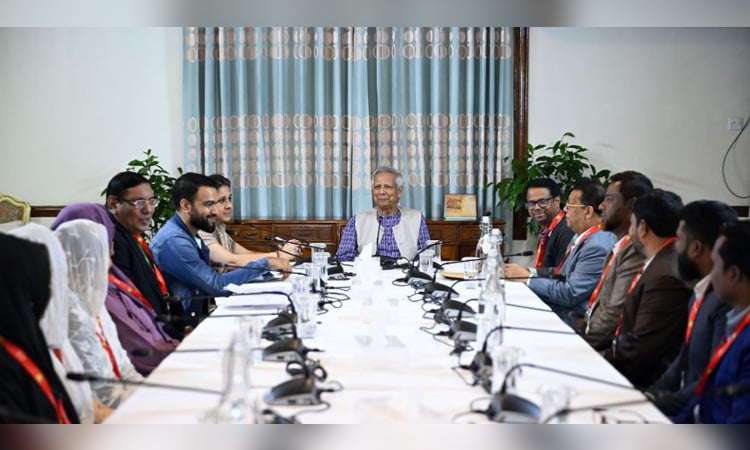By Alamgir Islam
When the people of Bangladesh finally broke free from the grip of authoritarian rule on 5th August 2024, the nation stood on the brink of a long-overdue democratic awakening. It was a moment of collective relief—an outcome of sustained public pressure to restore democracy, transparency, and accountability. The demand for a free, fair, and inclusive election under a neutral interim administration had echoed across the country for nearly a decade.
In response to this growing demand, on 8th August 2024, Dr. Younus was appointed as the Chief Adviser of an interim government. His task was clear and urgent: to rebuild public trust and oversee national parliamentary elections within a credible, inclusive, and peaceful framework. Initially, this transition brought hope that Bangladesh was finally on a path toward healing and reform.
Dr. Younus, however, did not stop at administering elections. He declared that a foundational reform process was required to ensure a more stable and inclusive democracy. As part of this effort, he established a number of commissions—including the Bangladesh Constitutional Reform Commission—appointing Dr. Ali Riaz as its Chairman. Dr. Riaz, a Bangladeshi-American political scientist with a long academic career, was entrusted with overseeing reform proposals that would shape the constitutional future of the country.
Yet instead of meaningful, ground-up reform, what the public received was a shallow, disconnected, and academically distant report—a so-called constitutional reform draft that many saw as little more than a “copy-paste” document. It lacked not only depth, but relevance to the unique socio-political reality of Bangladesh. There was no public consultation of substance. There was no meaningful engagement with political parties. There was no reflection of the people’s lived experiences or aspirations.
Soon after, Dr. Riaz found his way into another position of influence: this time as Vice Chairman of the newly formed Jatiya Oikkomoto Commission (National Consensus Commission), with Dr. Younus as Chairman. This move was widely perceived as a continuation of power consolidation by a narrow intellectual circle—detached from the masses, yet fully embedded within the structures of government. While enjoying the perks, privileges, and resources of public office, they presented themselves as impartial reformers.
What worsened public perception was the inclusion of individuals from outside Bangladesh, many of whom had no ties to the country’s current political struggles, and more importantly, no connection to the historic 5th August uprising. The very people who fought and sacrificed to bring down the previous regime were once again left without a voice—excluded from shaping the future of the democracy they had helped rescue. It was a deeply alienating decision, one that further eroded the credibility of the commission and cast serious doubt on its purpose.
From that point onward, the Jatiya Oikkomoto Commission increasingly became a symbol of elitism and exclusion. Instead of bringing opposing voices together and fostering national unity, it acted as a gatekeeper—repeating the old cycle of “divide and rule” in the name of consensus.
Let us be absolutely clear: as long as Dr. Ali Riaz remains Vice Chairman of the Jatiya Oikkomoto Commission, the people and political parties of Bangladesh will never unite—not even on the Day of Judgment. His leadership has come to symbolize not dialogue, but arrogance; not unity, but division.
Even more troubling is the personal style Dr. Riaz has adopted—behaving as though all political parties, individuals, and civil society actors are his students. Observers describe his tone as condescending, his demeanor as patronizing, and his interactions as those of someone smiling smugly while “educating” the nation. This is not the spirit of participatory democracy. It is academic authoritarianism, thinly disguised as reform.
The lack of transparency in the commission’s work only adds to public frustration. Entrusted with the sacred responsibility of guiding constitutional reform, the commission has instead taken a top-down, exclusionary approach. Political stakeholders—including major opposition parties like the Bangladesh Nationalist Party (BNP)—have strongly criticized the process. They have pointed out that many serious reform proposals submitted by credible individuals and commissions were either ignored or quietly dismissed.
Even the mechanism for public input was insulting in its simplicity. The commission reduced complex constitutional questions to yes/no checkboxes—a process so binary and restrictive that it stripped away all nuance, discouraged thoughtful engagement, and silenced dissenting voices. It was not consultation; it was window-dressing.
Nowhere is the commission’s incoherence more obvious than in its own policy contradictions. On one hand, it proposed removing Article 70A, which currently prevents MPs from voting independently of their parties. This was framed as a step to restore parliamentary independence. On the other hand, the commission also recommended introducing a Proportional Representation (PR) voting system, in which voters cast their ballots for parties, not individual candidates. This would, in fact, increase party control and diminish accountability to voters. The contradiction is glaring. One reform claims to liberate MPs; the other seeks to control them even more tightly.
These contradictions reveal a deeper truth: the commission is not grounded in the public interest, nor guided by a clear national vision. It is drifting between imported ideas and academic theories, none of which are rooted in the Bangladeshi experience. The result is confusion, disillusionment, and a growing sense among the public that this process is nothing more than political theatre.
So we must now ask the obvious question: Is the Jatiya Oikkomoto Commission truly building national consensus—or is it merely legitimizing a pre-written political script?
The people of Bangladesh deserve better. They deserve reform that is transparent, inclusive, and responsive to public needs. Not backdoor deals. Not intellectual elitism. Not copy-paste solutions.
Let us be absolutely clear: true national unity is not something you declare in a commission title. It is earned through humility, sincerity, and trust.
🔴 Conclusion: Time to Dismantle and Rebuild
It is time to abolish the Jatiya Oikkomoto Commission in its current form. It must be replaced with a new, inclusive body—composed of real representatives from all walks of Bangladeshi society: political leaders, grassroots organizers, civil society members, academics rooted in national reality, and voices from across social classes. Only then can true consensus emerge.
Until that happens, any dialogue under this commission must be suspended immediately. Continuing down the current path will only lead to further division, alienation, and democratic decay.
It must also be said: Dr. Ali Riaz does not represent the BNP, the NCP, Jamaat-e-Islami, or the people of Bangladesh at large. His actions and ideological leanings indicate that he is working not in the interest of the people, but in alignment with outside influences and a vision disconnected from our national needs.
If we want a truly united, democratic Bangladesh, then we must have the courage to say: Enough is enough.
— Alamgir Islam










